- Home
- Raymond Benson
The Secrets on Chicory Lane Page 5
The Secrets on Chicory Lane Read online
Page 5
“I thought we were going to do what we did last time,” he said.
“No, let’s just kiss.”
We continued, but I could tell he wasn’t very happy.
In the month of June, 1966, Eddie Newcott and I officially became boyfriend and girlfriend. We kissed a lot. The other kids made fun of us, so we did our best to avoid everyone. My mother expressed concern, but there wasn’t much she could do about it. Eddie lived right across the street, and if we couldn’t visit each other at our respective homes, then we’d meet at the park. We made out in the derelict yacht. We kissed in the airplane cockpit.
The hiding place in the floor of the bomb shelter also became the medium for a game. We would be somewhere, the park perhaps, when Eddie would say, “Davy Jones’s Locker.” That meant it would be up to me to go to his backyard by myself, when he wasn’t around, and sneak into the bomb shelter. I learned how to lift that concrete slab in the floor and search the hiding place. Several times, Eddie left me notes or presents. A package of M&M’s. Notes that were the eleven-year-old equivalent of love letters, written on Big Chief ruled tablet paper and printed in block letters—a writing style that Eddie kept throughout his life. “For my prinsess across the street,” one note read. There were drawings of lips, meant to signify kisses. I wish I’d kept those early communications from Eddie, but at the time I was afraid to do so. My mother or father might find them, and I feared they wouldn’t understand.
For a week, we pretended to be secret agents, using the hiding place to leave clues for each other to solve a hide-and-seek puzzle. I made one up and he made up another; I had to solve his and vice versa. I remember having to find a Spider-Man comic book hidden in the airplane in the park. Everyone was spy-crazy in 1966. Television and movies were full of spy shows like The Man from U.N.C.L.E. or I Spy or The Avengers, and there were movies with James Bond or Matt Helm or Derek Flint. He was the dashing Sean Connery type and I was the gorgeous Diana Rigg clone. He’d say to me, “Davy Jones’s Locker,” and I knew immediately where I needed to go to get the instructions for my next mission, instructions like: “Meet me at the park at noon”; “Your prize is inside the empty vase outside the house;” “Call me at 7:00 sharp.” It was silly, but it was fun. For an eleven- and twelve-year-old, playing spies was exotic and exciting.
We were at the park on one such day, gliding back and forth on the swings and discussing various topics. Since Eddie saw a lot of movies, he would tell me about them and practically act out all the parts. It was very entertaining. He was a talented actor but didn’t seem to have the desire to pursue the craft at that time. Later, however, the persona he adopted as an adult was a magnificent performance of artifice, and one that few people saw through.
In the middle of swinging conversation, Eddie suddenly said, “Davy Jones’s Locker.”
I groaned aloud and told him I didn’t want to play that game anymore.
“Well, you’ll miss out, then,” he said, which did the trick to tempt me.
Conveniently, Eddie had to leave with his mother somewhere—a dentist appointment or something like that. Mr. Newcott wasn’t home. As soon as they left in the family car, I went across the street and into their backyard. Without hesitation, I opened the fallout shelter door, turned on the lights, and climbed down—a familiar route. Everything looked the same; the cots were made up neatly with sheets and blankets. Long-expired canned goods and other essentials lined the shelves. I crossed the floor to the other side, went behind the partition, and got on my hands and knees behind the toilet. It was always difficult to get a grip on the concrete slab at first; there was a knack to doing it, and it took me several tries before I managed to pry it open.
Along with Eddie’s usual supply of magazines and toys, there was an envelope with my name on it. Inside, I found a note printed in his easily recognizable hand, along with a drawing of a prince fighting a dragon. An inscription read, “I WILL BE YOUR NIGHT—Eddie.” Okay, he wasn’t the best speller; I knew he meant knight. The note touched me deeply. It’s among the few mementos I kept—and still own—from that period of our relationship.
Later, I got another note:
JUNE 21, 1966
DEAR SHELBY—
THANK YOU FOR LIVING ACROS THE STREET. YOU ARE THE BEST THING IN MY LIFE. I DONT NO WHAT I WOOD DO WITH OUT YOU. I LOVE YOU.
EDDIE
Despite the spelling and grammatical errors, it was sweet. He really did know how to charm a girl.
Over the remaining course of our young romance, Eddie and I never did anything like that first peek-a-boo session in the bomb shelter again.
At least, not until we were in our twenties.
6
The airline crew member makes the announcement that it’s time to board the plane. I’d been so lost in my thoughts that I forgot to go to the ladies room, as I usually do before flights. It’s too late now; the call has come for first class passengers to step up to the gate. Once I claim my seat and get settled, I use the lavatory, return to my seat, and strap myself in. We take off on time. I gaze dreamily out the window as the memories of June 1966 return.
Our house on Chicory Lane. I can visualize certain things about it—the squatty brown exterior with a picture window that was the mouth of an imaginary face, for example. The single-car garage door that acted as a right eye, and two of my bedroom windows that served as the left one. My father was the one who pointed this out to me when I was little. I was sitting in the front seat of the car—a no-no today, but in the early sixties kids climbed all over the inside of a car while it was on the road—as we pulled up into our driveway. It was dark outside. The light was on in our front room, and we could see Mom standing at the window, peering out at us. Dad said, “Shelby, doesn’t it look like Mom is inside the mouth of a big face? Look! You see it?” I squinted to look, and after a second or two, my brain put the puzzle pieces together and I got it. It was indeed a face. I’ll always remember that.
Strangely, my recollections of the inside of the house are more elusive. I can recall the path through the house to my room from the front door. The front room contained the piano, where I used to spend a lot of time; I was never very good at piano, though, and obviously I never pursued it. To this day, I don’t have a clue what my parents’ bedroom looked like. My own was, in my mind, a generic American girl’s bedroom with all the standard accessories—twin bed with stuffed animals, a simple painted oak desk and chair, a bookcase, and a closet. When I first visited home after going away to college, I was struck by how small it was. For the longest time, we only owned a black-and-white television. When the other kids talked about how their families had gotten color TVs, I was jealous. When we finally got one, it was after the tragic events of 1966. By then, it was too late. It wasn’t pleasant sitting in that living room in front of our color TV, attempting to be a normal family again.
All the houses on the block were more or less the same.
I had a habit of leaving the front door unlocked in the daytime so I could go in and out without a key. In those days, kids didn’t carry house keys like they do now. I don’t think I even owned one. Sometimes, my mother would admonish me. “We can’t have any Tom, Dick, or Harry walking in our house,” she’d say. The fact that our neighborhood was, allegedly, very safe didn’t make locking the door a huge priority for me. Mom kept saying she’d get a key made that I could use, but I guess she never did.
As a matter of fact, the kids in our neighborhood did have something of an unofficial open-door policy. If you were good friends with someone, and his or her door was unlocked, you could go inside. There were times when I’d come out of my bedroom, walk down the hall, enter the living room—and there was Eddie, sitting and waiting for me. Several days that June, during the weeks Eddie and I were fooling around, he just let himself in and turned on the television. It was fine, a regular occurrence at our house. We’d sit and watch a show together while my mother tended to baby Michael in the nursery, the bedroom next to mine. I wouldn�
��t have been allowed to have Eddie over if we were alone. Mom stayed in the bedrooms most of the time, and Eddie and I were often by ourselves in the living room. We had to put up with her periodically coming through on her way to the kitchen and back. We managed to sneak in a few kisses. Whenever Michael did his colicky child act, Mom would calm him down and retreat to her own room to lie down. As soon as she did, he’d cry again. So, I often got up to perform the duty. The crying annoyed Eddie. He always complained that we couldn’t hear the TV because of Michael.
“Let’s go to the bomb shelter,” he’d suggest.
One day, my mind was made up. I don’t know why or how I finally came to the decision to tell him I didn’t want to go to the bomb shelter anymore. It happened too long ago for me to totally recall what was going on in my head at the time. I had enjoyed the encounters in our secret place, but soon he seemed to want to do more taboo stuff than just kissing, and I felt uncomfortable. Eddie thought I didn’t like him anymore. That wasn’t true. I liked him tremendously; I just didn’t want to do what we had done that very first time in the bomb shelter. Maybe I was afraid of being caught. Perhaps I had feelings of guilt. I still enjoyed being with him, and I allowed him to kiss me, but the truth is I was freaked out by the shelter—it was creepy. I didn’t like the claustrophobic feeling I got when I spent more than a half hour in its basement. Claustrophobia is something I’ve experienced my whole life, I’m afraid; I have never liked confined spaces. An airplane trip is tolerable for several hours, but if it’s ten hours or more in the air, I get anxious and restless. I hate excursions to the Far East!
Nevertheless, during this period, Eddie and I continued to be very close. We told each other everything—all our secrets and wishes and dreams. Eddie wanted to be a great artist, one who drew comics. I thought I wanted to act on stage—and I did, a little—but mostly I wanted to write plays. I suppose I have already accomplished my childhood goals. Eddie eventually did do some work in comics in his twenties and thirties, but not much after that.
Eddie’s cat Jimmy died around this time. He was found one morning lying in Eddie’s front yard. I didn’t see it for myself, but I heard about it. Eddie was very upset. He displayed a vulnerability I hadn’t seen before, and claimed his father had killed Jimmy because he hated the cat and wanted to punish Eddie for something ridiculous. For days afterward, all Eddie would do was curse his father and repeat how much he hated him. I felt bad for Eddie, but I was sorrier for the cat. Jimmy, though a bit wild, had been a good pet. I was finally starting to agree with Eddie that Mr. Newcott was a terrible person.
For the rest of June, Eddie and I spent a lot of time in the park. I never went back to the bomb shelter with him; we also didn’t go into his house. He’d come over to mine, but he couldn’t stand hearing Michael cry and would leave soon after. At the end of June, my mother finally came to me and said, “You’re too young to be kissing boys.” I clearly remember those distinct words and how shocked I was to hear them. How did she know? She’d never seen us. It was the first time Mom had ever said anything about me spending so much time with Eddie. She had cautiously allowed us to “play together,” but she kept asking me if I knew any girls to call. What happened to Sally? I explained that Eddie was my best friend; he was like a brother to me.
“I’m not kissing boys,” I responded.
“Don’t lie to me, young lady, or you’ll be spending the summer grounded.”
I didn’t argue with her, but I kept seeing Eddie. There was really no way to stop us getting together in the park without keeping me at home, and that wasn’t going to happen. And besides, she really couldn’t complain about me—I did my share of helping around the house with the baby and all. I had my chores, and I always did them. I fed Michael and changed his diapers and played with him. Still, most of the time he just cried. I suppose Mom took him to the pediatrician to find out if there was anything else wrong, but it was just one of those things. Some babies have a hard time being colicky, and Michael would have to outgrow it. We did everything we could—holding him, burping him more often, rubbing his back and tummy, and taking him for car rides and walks in the stroller, but they were of no use. At least Michael liked his rattle. It was a blue-and-white barbell-shaped toy about six inches long. When Michael shook it, his eyes grew wide as if amazed that he could cause the thing to make such a noise. The rattle quickly became a first-response cure for attacks of colic. “Quick! Where’s his rattle? Oh, here it is, under the blanket.” Though it didn’t work all the time to alleviate his discomfort, the rattle became an additional appendage to his little hand.
Eddie continued to visit Gordon Alpine. He tried to talk me into going to Mr. Alpine’s house with him, and I did, once. Mr. Alpine gave us both ice cream and showed us his collection of board games. After hearing about his past from my parents, I looked around his living room for evidence that he’d been married. There were no family photos that I could see, except for one of him standing with his brother, the mayor of Limite. There was definitely nothing displayed to commemorate the memory of a deceased child. Maybe he had something hidden away in another part of the house, I thought. At any rate, I never detected a problem with our peculiar neighbor. To us, he was as nice as a neighbor could be.
I can pinpoint when the trouble started—on a day approaching the Fourth of July. Eddie was over to visit. He talked about getting hold of fireworks and shooting them in the park. In those days, there were no laws against fireworks in Limite, and people went all-out on the Fourth. Fireworks vendors set up their stands on the outskirts of town and made a killing. I was looking forward to spending time with Eddie on the holiday, too.
While we were watching TV, Michael started crying. My mother was in the laundry room, or, as she called it, the “utility room,” which was just off to the side from the kitchen. I got up and went to the nursery to see what I could do, as Eddie tailed along. He watched as I did the walk-around-the-room-and-bounce maneuver. All three of us—Mom, Dad, and I—had found that this method sometimes worked in quieting Michael, and we called it “the bounce.” It was a fast but gentle up-and-down motion that simulated a vibrator. The bounce was successful after a few minutes, so I put the baby back in his crib. We returned to the living room, only to hear my mother calling me to help her with something in the garage. I left Eddie in front of the TV. “Listen for Michael, will you?” I said. I went out the kitchen door into our attached garage, where we kept the family car and other stuff like my bicycle, camping equipment, and miscellaneous junk. In the middle of our work, we heard Michael screaming. We rushed through the living room—Eddie wasn’t there—and into the nursery.
Eddie stood in the middle of the room holding Michael, attempting to do the bounce. He was performing the maneuver way too hard. Mom freaked out. “Stop it!” she yelled and snatched Michael from Eddie’s arms. “What were you doing?”
“Nothing! He started crying, and Shelby was in the garage. I thought I’d do what Shelby did to try and stop it.”
“You could have hurt him!”
“I’m sorry, I didn’t mean—”
“Eddie, I think you should go on home. I need Shelby to do some chores. Go on. We’ll see you another time.”
He looked at me, hoping, I think, that I would protest. I didn’t. The sight of Eddie with Michael had surprised me, too. “I’ll see you later, Eddie,” I said.
After he’d left, Mom turned to me. “I don’t want you playing with him anymore. He’s not welcome in this house again. I don’t like him.”
“Mom!” I protested, trying to convince her that Eddie hadn’t meant any harm. She wouldn’t budge.
“And you’re going to start locking that front door whether you’re inside or out. I’ll get you a key tomorrow.”
She snapped at me again, and I started crying. I spent the rest of the day very upset. She never got me a key, and I continued to leave the door unlocked. My mother seemed to be going through something; in retrospect, I think her hormones had gone haywire
from having a child at a later age. In general, I’m made to believe that relationships between mothers and daughters can often be stormy. Ours was particularly so. At the time Michael was born, I was getting to be the age in which I couldn’t help challenging my mother. She was the parent I was around the most, so it seemed that I received the brunt of anything that displeased her. It got worse as the years went on, and I’m afraid that I’m guilty of not doing more to repair what came between us.
I told Eddie that my mother wouldn’t let me see him anymore when we met the next day at the park—at least like how we’d been doing. I cried, and he got angry. He said that my mother had no business keeping us apart. He claimed he hated her, and I didn’t like that. I told him I was just as mad and heartbroken about the ultimatum as he was, but I didn’t hate my mom. “Maybe we are too young to be boyfriend and girlfriend,” I said, “but we can still be friends.” That made him go berserk. I’d never seen him get so agitated before. He complained that nothing good ever happened to him, and finally he said goodbye.
“I’m going to Mr. Alpine’s house,” he said. “He appreciates me!” He left me inside the hull of the old yacht feeling wretched. I thought I was going to die. The pain in my chest was unbearable. First heartbreak—it’s a killer. There was also the self-reproach for having to hurt Eddie, who obviously took it even harder than me. Mr. Alpine would be a comfort to Eddie, I thought to myself. Visiting him would get my former boyfriend’s mind off of me. How do you like that? I was more concerned with how badly Eddie had taken our “breakup” than how I personally felt about it. Still, it was painful. I tried to tell myself that we’d still see each other. We went to the same school and he lived right across the street! And there was always the park. It was impossible to avoid each other. Wasn’t that a good thing?
As the Fourth of July approached, I didn’t see Eddie at the park or on the block. I ventured outside once to look for him, but one of the kids said he had seen Eddie going into Mr. Alpine’s house. Fine, I thought, if he’s going to hide, then so be it. He would get over it eventually. By July 3, though, I was beginning to get a little anxious. I figured it wouldn’t hurt just to see him and find out how he was doing. Show that we were still friends.

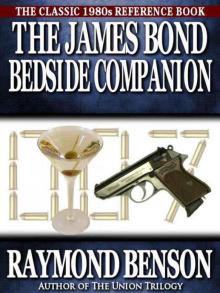 The James Bond Bedside Companion
The James Bond Bedside Companion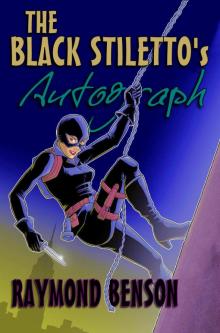 The Black Stiletto's Autograph
The Black Stiletto's Autograph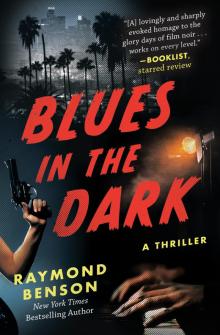 Blues in the Dark
Blues in the Dark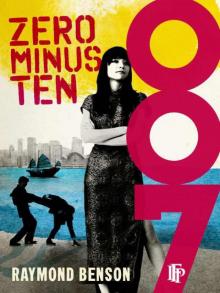 Zero Minus Ten
Zero Minus Ten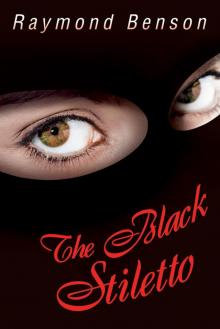 The Black Stiletto
The Black Stiletto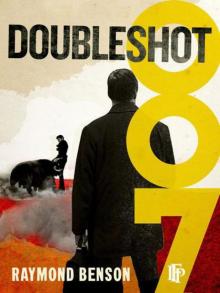 Doubleshot
Doubleshot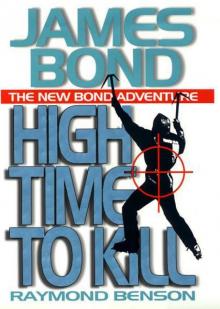 High Time To Kill rbb-3
High Time To Kill rbb-3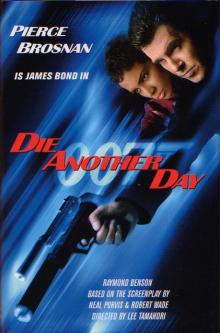 Bond Movies 07 - Die Another Day
Bond Movies 07 - Die Another Day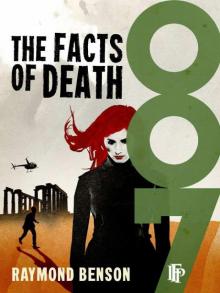 The Facts Of Death
The Facts Of Death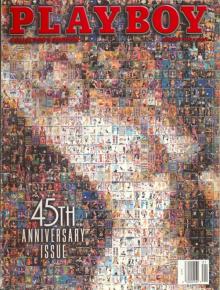 Midsummer Night's Doom
Midsummer Night's Doom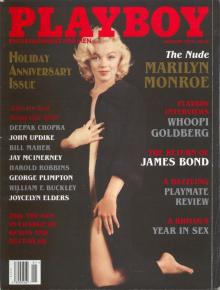 Blast from the Past
Blast from the Past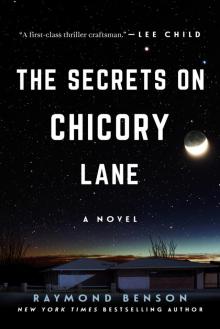 The Secrets on Chicory Lane
The Secrets on Chicory Lane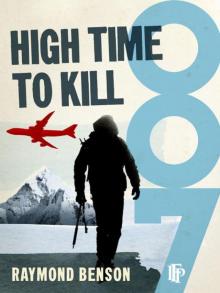 High Time To Kill
High Time To Kill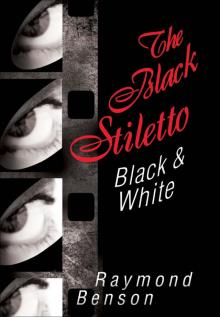 The Black Stiletto: Black & White
The Black Stiletto: Black & White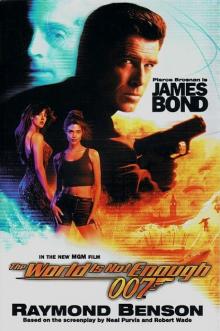 The World Is Not Enough jb-1
The World Is Not Enough jb-1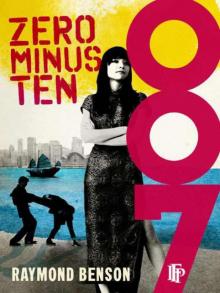 Zero Minus Ten rbb-1
Zero Minus Ten rbb-1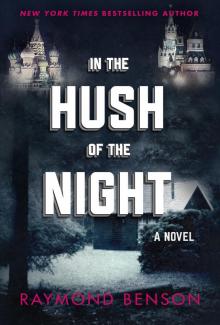 In the Hush of the Night
In the Hush of the Night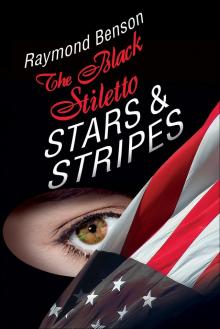 The Black Stiletto: Stars & Stripes
The Black Stiletto: Stars & Stripes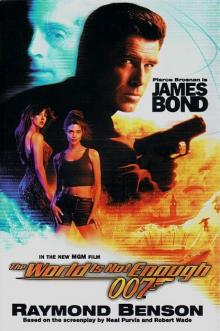 Bond Movies 06 - The World Is Not Enough
Bond Movies 06 - The World Is Not Enough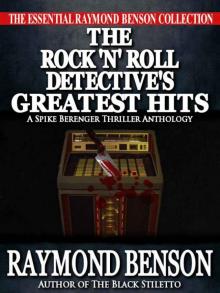 The Rock 'n Roll Detective's Greatest Hits - A Spike Berenger Anthology
The Rock 'n Roll Detective's Greatest Hits - A Spike Berenger Anthology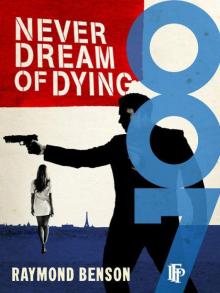 Never Dream Of Dying
Never Dream Of Dying